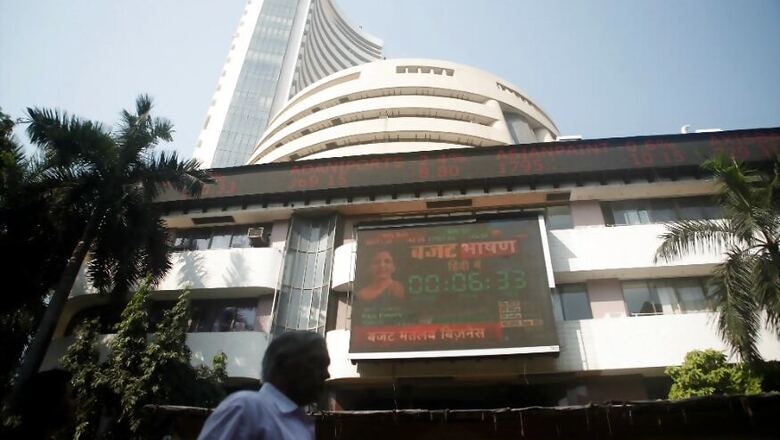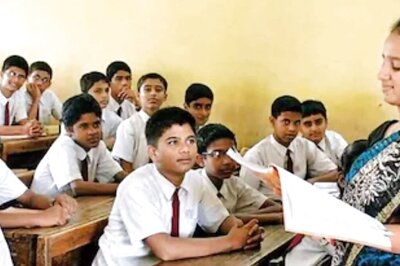
views
New Delhi: The Indian market witnessed a kneejerk reaction as Finance Minister Nirmala Sitharaman presented the Union Budget in Parliament, pushing the Sensex lower by more than 988 points to break below the 40,000 mark while the Nifty50 ended below 11,700.
Investors lost nearly Rs 3.6 lakh crore in a single day.
The massive sell-off in equity market wiped out investor wealth, which fell by Rs 3,46,256.76 crore to Rs 1,53,04,724.97 crore on the Bombay Stock Exchange (BSE). Market capitalisation of BSE-listed firms plunged as the Sensex plummeted 987.96 points to close at 39,735.53.
This was the benchmark's biggest drop since October 24, 2008, when it had plummeted 1,070.63 points, and the fourth biggest fall overall.
"The lack of major growth boosting measures in itself is negative for the equity market. The new income tax regime would also be negative for tax exempt equity savings schemes. Recasting of dividend taxation norms also seem to be on the balance negative for most domestic equity investors. Overall, the budget seems to be negative for the equity market," said Anand Rathi Shares & Stock Brokers Chief Economist and Executive Director Sujan Hajra.
But experts see it as a non-event from a market standpoint as the requirement of the hour was much more compared to what the government delivered.
Here are five factors that could be leading to a sell-off on D-Street:
No LTCG & STT tweak:
The Long Term Capital Gains Tax (LTCG) as well as Security Transaction Tax (STT) were not touched in the Union Budget 2020.
The re-introduction of LTCG Tax in 2018 disincentivises the equity shareholder who holds for a longer period, and also depresses the flow of money into such an instrument.
So the abolition of LTCG Tax on equities holds the potential to provide a sentiment booster for the equity market, say experts.
DDT still taxed in the hands of recipients:
The abolition of Dividend Distribution Tax (DDT) in the hands of corporates is a positive move, but it is still taxed in the hands of recipients.
“I propose to remove the DDT and adopt the classical system of dividend taxation under which companies would not be required to pay DDT,” Sitharaman said in the Budget speech. “The dividend shall be taxed only in the hands of the recipients at their applicable rate.”
No big spending or stimulus:
The Budget fell short of expectations of giving the intended stimulus, which could put the economy back on the high growth path.
Measures to boost revenue growth were the main challenge for the government in the face of slackening economic growth, suggest experts.
Complicated Personal Taxes:
Sitharaman introduced new slabs and reduced the tax rate for different slabs for an individual income up to Rs 15 lakh per annum if a taxpayer opts for foregoing exemptions and deductions.
The new tax regime will be optional and taxpayers will be given the choice to either remain in the old regime with exemptions and deductions or opt for the new reduced tax rate without those exemptions.
Under the proposal, people with an annual income of Rs 5 lakh to Rs 7.5 lakh will have to pay a reduced tax rate of 10 percent; between Rs 7.5 lakh and Rs 10 lakh: 15 percent; between Rs 10 lakh and 12.5 lakh: 20 percent; between Rs 12.5 lakh and 15 lakh: 25 percent; and above Rs 15 lakh: 30 percent.
Deductions forgone under new tax regime:
In order to simplify the income tax system, Sitharaman has reviewed all the exemptions and deductions incorporated in the income tax legislation over the past several decades.
“It was surprising to know that currently more than 100 exemptions and deductions of different nature are provided in the Income Tax Act. I have removed around 70 of them in the new simplified regime,” she said.
“We will review and rationalise the remaining exemptions and deductions in the coming years with a view to further simplifying the tax system and lowering the tax rate,” she added.
An optional personal tax regime has been proposed where individuals earning Rs 15 lakh will save Rs 78,000 of tax liability on account of changes proposed in the slab and tax rates.
"The budget is good on intent. However, the key is efficient execution in a time-bound manner. There are many positives to simplify things and encourage entrepreneurs but again, key will be execution in a time-bound manner. Intent needs to be converted into implementation," said Kotak Mahindra Asset Management Company MD and CEO Nilesh Shah.
Sitharaman said the improvement in revenue generation gives hopes of lowering the fiscal deficit to 3.5% of GDP in the next fiscal from 3.8% in the current.
From the 30-share pack on BSE, 24 companies suffered losses, led by ITC, Larsen & Toubro, HDFC and State Bank of India.
(With inputs from agencies)




















Comments
0 comment